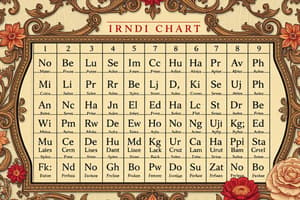Podcast
Questions and Answers
What are the 5 factors to consider in the classification of consonants?
What are the 5 factors to consider in the classification of consonants?
Voicing, Place of Articulation, Central or Lateral Articulation, Oral or Nasal, Manner of Articulation
What does voicing refer to?
What does voicing refer to?
What the vocal folds are doing.
Voiced sounds are produced with ________________ vocal folds.
Voiced sounds are produced with ________________ vocal folds.
vibrating
Voiceless sounds are produced when vocal folds are ________________.
Voiceless sounds are produced when vocal folds are ________________.
Are the following examples voiced or voiceless?
Are the following examples voiced or voiceless?
Are the following examples voiced or voiceless?
Are the following examples voiced or voiceless?
___________________________ refers to where in the vocal tract constriction of airflow takes place.
___________________________ refers to where in the vocal tract constriction of airflow takes place.
When a sound is made with both lips touching the place of articulation is __________________.(Ex: 'pie')
When a sound is made with both lips touching the place of articulation is __________________.(Ex: 'pie')
When a sound is made with the lower lip and upper front teeth the place of articulation is __________________.(Ex: 'fie')
When a sound is made with the lower lip and upper front teeth the place of articulation is __________________.(Ex: 'fie')
When a sound is made using the tongue tip or blade and teeth the place of articulation is _________________.(Ex: 'thigh')
When a sound is made using the tongue tip or blade and teeth the place of articulation is _________________.(Ex: 'thigh')
When a sound is made with the tongue tip or blade and the alveolar ridge the place of articulation is _________________.(Ex: 'tie')
When a sound is made with the tongue tip or blade and the alveolar ridge the place of articulation is _________________.(Ex: 'tie')
When a sound is made with the tongue blade and the area just behind the alveolar ridge the place of articulation is _________________.(Ex: 'shy')
When a sound is made with the tongue blade and the area just behind the alveolar ridge the place of articulation is _________________.(Ex: 'shy')
When a sound is made with the front/center of the tongue and the hard palate the place of articulation is _________________.(Ex: 'few')
When a sound is made with the front/center of the tongue and the hard palate the place of articulation is _________________.(Ex: 'few')
When a sound is made with the back of the tongue and soft palate (velum) the place of articulation is _________________.(Ex: 'kite')
When a sound is made with the back of the tongue and soft palate (velum) the place of articulation is _________________.(Ex: 'kite')
When a sound is made at the level of the glottis the place of articulation is _________________.(Ex: 'hi')
When a sound is made at the level of the glottis the place of articulation is _________________.(Ex: 'hi')
What does manner of articulation refer to?
What does manner of articulation refer to?
Stops involve complete closure of the mouth and raised soft palate (velum).
Stops involve complete closure of the mouth and raised soft palate (velum).
The sounds in the image are classified as stops.
The sounds in the image are classified as stops.
___________________ is a period of voicelessness after the stop articulation and before the start of voicing for the vowel.
___________________ is a period of voicelessness after the stop articulation and before the start of voicing for the vowel.
_________________ involve a tightly constricted airway that causes air turbulence at the point of constriction. (bottleneck of airflow like in /v/)
_________________ involve a tightly constricted airway that causes air turbulence at the point of constriction. (bottleneck of airflow like in /v/)
_________________ result from a sequence of a stop plus a fricative in rapid succession. (Ex: chick)
_________________ result from a sequence of a stop plus a fricative in rapid succession. (Ex: chick)
_________________ are produced when two articulators approach or approximate each other without the vocal tract being narrowed to an extent that turbulent airstream is produced.
_________________ are produced when two articulators approach or approximate each other without the vocal tract being narrowed to an extent that turbulent airstream is produced.
Stewie from Family Guy saying 'cool whip' is an example of a __________________.
Stewie from Family Guy saying 'cool whip' is an example of a __________________.
Approximate _____________ are produced with very little constriction of airflow. (Ex: /w, j, hw/)
Approximate _____________ are produced with very little constriction of airflow. (Ex: /w, j, hw/)
Approximate _______________ are vowel-like consonants in which airflow passes through the vocal tract that is only constricted somewhat more than for vowels. (Ex: /l/)
Approximate _______________ are vowel-like consonants in which airflow passes through the vocal tract that is only constricted somewhat more than for vowels. (Ex: /l/)
Most speech sounds are made with lateral airflow.
Most speech sounds are made with lateral airflow.
A ____________ is an allophone that occurs when the tongue makes a single tap against the alveolar ridge like in the word 'daddy'.
A ____________ is an allophone that occurs when the tongue makes a single tap against the alveolar ridge like in the word 'daddy'.
A ________________ stop is the lack of sound that occurs when the vocal folds are held tightly together.
A ________________ stop is the lack of sound that occurs when the vocal folds are held tightly together.
The rolled r in the word 'burro' is called a ____________.
The rolled r in the word 'burro' is called a ____________.
When naming consonant sounds VPM stands for __________________, _________________, and _________________.
When naming consonant sounds VPM stands for __________________, _________________, and _________________.
Study Notes
Classification of Consonants
- Five factors in consonant classification: voicing, place of articulation, central or lateral articulation, oral or nasal, manner of articulation.
Voicing
- Voicing indicates whether vocal folds vibrate during sound production.
- Voiced sounds are produced with vibrating vocal folds.
- Voiceless sounds occur when vocal folds are apart.
Place of Articulation
- Place of articulation refers to where airflow constriction occurs in the vocal tract.
- Types of places of articulation include:
- Bilabial: Both lips touching (e.g., "pie").
- Labiodental: Lower lip and upper front teeth (e.g., "fie").
- Dental: Tongue tip against teeth (e.g., "thigh").
- Alveolar: Tongue against the alveolar ridge (e.g., "tie").
- Palato-alveolar: Tongue blade just behind the alveolar ridge (e.g., "shy").
- Palatal: Front of the tongue against the hard palate (e.g., "few").
- Velar: Back of the tongue and soft palate (e.g., "kite").
- Glottal: Sound made at the glottis (e.g., "hi").
Manner of Articulation
- Manner of articulation describes how sounds are produced and how the airflow is controlled.
- Stops involve complete closure of the mouth and a raised soft palate.
- Fricatives are characterized by a tightly constricted airway and turbulence at the constriction point.
- Affricates are a combination of a stop followed by a fricative (e.g., "chick").
- Approximates occur when two articulators approach each other without significant narrowing of the vocal tract.
- Glides are approximates with minimal constriction (e.g., /w, j, hw/).
- Liquids are vowel-like consonants with slight constriction (e.g., /l/).
Additional Concepts
- Aspiration is a voiceless period after stop articulation before vowel voicing begins.
- Most speech sounds feature central airflow, not lateral airflow.
- A tap is an allophone where the tongue briefly taps the alveolar ridge (e.g., in "daddy").
- A glottal stop occurs when vocal folds are held tightly together, resulting in a lack of sound.
- A trill occurs with a rolling of the tongue (e.g., in "burro").
- VPM refers to voice, place of articulation, and manner of articulation in consonant classification.
Studying That Suits You
Use AI to generate personalized quizzes and flashcards to suit your learning preferences.
Description
Explore the classification of consonants through various factors such as voicing, place of articulation, and manner of articulation. This quiz will enhance your understanding of how consonants are produced and categorized in linguistics. Perfect for students and language enthusiasts!




